Search the Special Collections and Archives Portal
Search Results
Audio recording clips of interview with Hazel Gay by Claytee D. White, December 2, 1995
Date
Archival Collection
Description
Three audio clips from an interview with Hazel Gay conducted by Claytee D. White on December 2, 1995. Hazel and her husband Jimmy Gay moved to Las Vegas in 1946, becoming leaders in the African American community during the civil rights era. In the clips, Gay recalls the Moulin Rouge from her perspective as manager of the dress shop.
Sound
Candidates Forum at the Gay and Lesbian Community Center of Southern Nevada: photographic prints, 1999 April 22
Level of Description
Archival Collection
Archival Component
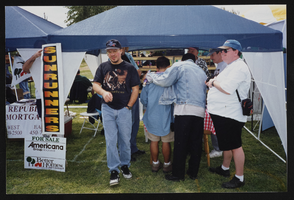
Sunrunners booth at Gay Pride: photographic print
Date
Archival Collection
Description
Gay Pride at Sunset Park, 1998. Photographer: Dennis McBride. Sunrunners booth.
Image
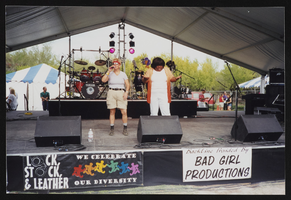
Unidentified entertainment at Gay Pride: photographic print
Date
Archival Collection
Description
Gay Pride 1999 (Dennis McBride, photographer) Sunset Park. (5-8-99) Entertainment.
Image
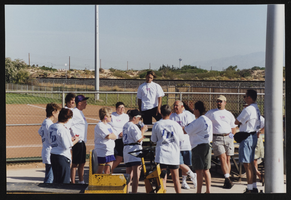
Event staff at Gay Pride: photographic print
Date
Archival Collection
Description
Image
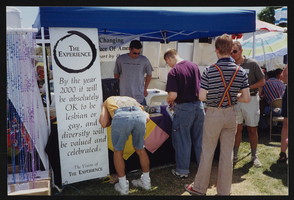
The Experience booth at Gay Pride: photographic print
Date
Archival Collection
Description
Image
Roxton Whitmore oral history interview
Identifier
Abstract
Oral history interview with Roxton Whitmore conducted by his grandson, Mark Whitmore, on October 22, 1972 for the Ralph Roske Oral History Project on Early Las Vegas. In this interview, Whitmore discusses his personal life, including his marriage and his political affiliations. Whitmore also describes the atomic bomb tests and automobiles.
Archival Collection
Harrah’s Entertainment Corporate Archives
Identifier
Abstract
The Harrah’s Entertainment Corporate Archives (dating from 1811 to 2004 with the bulk of the materials dating from 1940 to 2000) contain the promotional and corporate files of Harrah’s Entertainment Inc. and its predecessors, as well as Bill Harrah’s personal papers and card game collection. The materials were compiled and developed as a corporate archive by Harrah's Entertainment, Inc.’s Corporate Communications Department. The collection is primarily comprised of casino and employee periodicals, reports, manuals, promotional files, ephemera, and newspaper articles that document Bill Harrah’s casinos in Reno, Nevada and Lake Tahoe as well as Harrah’s Inc., Holiday Inns, Inc., Holiday Corporation, the Promus Companies, and Harrah’s Entertainment, Inc. Also included are photographs that document the construction of Harrah’s properties, business operations, the people who worked and performed at Harrah’s properties, and Bill Harrah’s automobile collection. The collection also contains Bill Harrah’s collection of playing cards and card games. Also included are photographs of the Harrah family.
Archival Collection
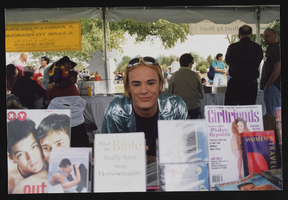
Michael Conarroe at Gay Pride: photographic print
Date
Archival Collection
Description
Image
Lillian Whalen oral history interviews
Identifier
Abstract
Oral history interviews with Lillian Whalen conducted by Laura Bell on September 21, 1974 and November 22, 1974 for the Ralph Roske Oral History Project on Early Las Vegas. In this interview, Whalen discusses her personal history in Boulder City, Nevada since the 1930s. Whalen then describes social life, the increase of local businesses, and the overall growth of Boulder City.
Archival Collection
